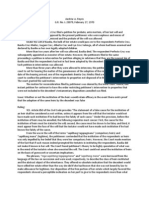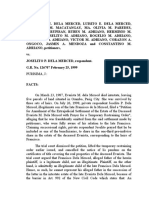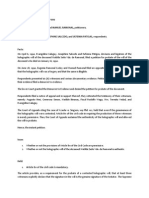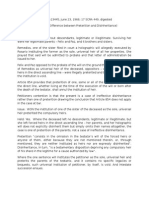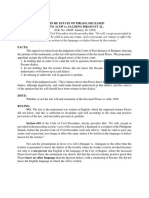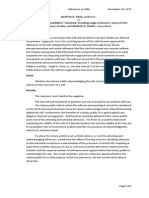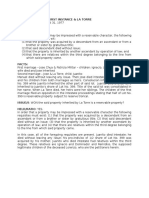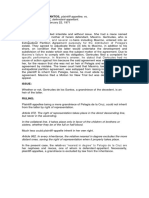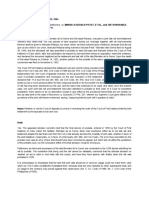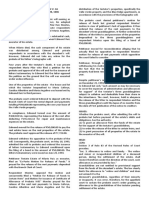Case Digest - Acain vs. Iac Et Al. GR # 72706, Oct.27,1987
Case Digest - Acain vs. Iac Et Al. GR # 72706, Oct.27,1987
Uploaded by
Clarisse TingchuyCopyright:
Available Formats
Case Digest - Acain vs. Iac Et Al. GR # 72706, Oct.27,1987
Case Digest - Acain vs. Iac Et Al. GR # 72706, Oct.27,1987
Uploaded by
Clarisse TingchuyOriginal Description:
Original Title
Copyright
Available Formats
Share this document
Did you find this document useful?
Is this content inappropriate?
Copyright:
Available Formats
Case Digest - Acain vs. Iac Et Al. GR # 72706, Oct.27,1987
Case Digest - Acain vs. Iac Et Al. GR # 72706, Oct.27,1987
Uploaded by
Clarisse TingchuyCopyright:
Available Formats
CASE DIGEST – ACAIN VS. IAC ET AL. GR # 72706, OCT.
27,1987
Preterition consists in the omission in the testator’s will of the forced heirs or anyone of them
either because they are not mentioned therein, or, though mentioned, they are neither
instituted as heirs nor are expressly disinherited. Insofar as the widow is concerned, Art. 854
of the Civil Code may not apply as she does not ascend or descend from the testator, although
she is a compulsory heir. Stated otherwise, even if the surviving spouse is a compulsory heir,
there is no preterition even if she is omitted from the inheritance, for she is not in the direct
line.
FACTS: Nemesio Acain executed a will whereby he gave all his shares in the conjugal
property to his brother Segundo. In case Segundo predeceases Nemesio, all his shares were
to be given to Segundo’s children. Segundo predeceased Nemesio. Thus, Constantino and
his brothers and sisters, the children of Segundo, fi led a petition for probate claiming the
property as Nemesio’s heirs. During the petition for probate, Virginia A. Fernandez, a legally
adopted daughter of Nemesio and the latter’s widow, Rosa Diongson Vda. de Acain, moved
to dismiss on the grounds: (1) Constantino has no legal capacity to institute these
proceedings; (2) he is merely a universal heir; and (3) the widow and adopted daughter
have been preterited. The trial judge denied the motion. The Intermediate Appellate Court
granted Virginia A. Fernandez’s petition and ordered the trial court to dismiss the petition for
probate of Nemesio’s will.
HELD: The Supreme Court in affi rming the Appellate Court’s decision held that the universal
institution of Constantino together with his brothers and sisters to the entire inheritance of the
testator results in totally abrogating the will because the nullifi cation of such institution of
universal heirs — without any other testamentary disposition in the will — amounts to a
declaration that nothing at all was written. Carefully worded and in clear terms, Article 854 of
the Civil Code offers no leeway for inferential interpretation. No legacies or devises having
been provided in the will, the whole property of the deceased has been left by universal title
to said heirs and his brothers. The effect of annulling the institution of heirs will be,
necessarily, the opening of a total intestacy except that proper legacies and devises must be
respected.
J. Ameurfi na Melencio-Herrera (concurring): One must distinguish whether the omission of
a forced heir in the will of the testator is by mistake or inadvertence, or voluntary or intentional.
If by mistake or inadvertence, there is true preterition and total intestacy results. The reason
for this is the “inability to determine how the testator would have distributed his estate if none
of the heirs had been omitted or forgotten.” On the other hand, if the omission is intentional,
the effect would be a defective disinheritance covered by Article 918 of the Civil Code in which
case the institution of heir is not wholly void but only insofar as it prejudices the legitime of
the person disinherited, i.e., the nullity is partial unlike in true preterition where the nullity is
total. Preterition is presumed to be only an involuntary omission, i.e., that if the testator had
known of the existence of the compulsory heir at the time of the execution of the will, he would
have instituted such heir. On the other hand, if the testator attempts to disinherit a compulsory
heir, the presumption of the law is that he wants such heir to receive as little as possible from
the estate.
You might also like
- Extrajudicial Settlement of Estate With Conditional Deed of SaleDocument6 pagesExtrajudicial Settlement of Estate With Conditional Deed of SaleConcepcion Cejano25% (4)
- Deed of Sale of Condominium TemplateDocument4 pagesDeed of Sale of Condominium TemplateVon AtibulaNo ratings yet
- Caneda Vs Ca G.R. No. 103554 May 28, 1993 FactsDocument3 pagesCaneda Vs Ca G.R. No. 103554 May 28, 1993 FactsHappy Kid100% (1)
- Estate MGT Adewale Siwes Report-1Document14 pagesEstate MGT Adewale Siwes Report-1Elijah Adeyemo Oluwatobi100% (1)
- Acain Vs IacDocument7 pagesAcain Vs IacIvan Montealegre ConchasNo ratings yet
- Azuela V CA and CastilloDocument2 pagesAzuela V CA and CastilloGillian Calpito100% (3)
- 11 Baltazar vs. LaxaDocument1 page11 Baltazar vs. LaxaJoshua Erik Madria100% (1)
- Vda de Tupas Vs RTC of Negros OccidentalDocument2 pagesVda de Tupas Vs RTC of Negros OccidentalwesleybooksNo ratings yet
- Pecson V MediavilloDocument4 pagesPecson V MediavilloHiezll Wynn R. RiveraNo ratings yet
- Ortega v. ValmonteDocument2 pagesOrtega v. ValmonteAnjNo ratings yet
- Dy Yieng Seangio Vs Hon ReyesDocument2 pagesDy Yieng Seangio Vs Hon ReyesFrancis Coronel Jr.100% (3)
- Case Digests On Testamentary Succession (Articles 783-870)Document166 pagesCase Digests On Testamentary Succession (Articles 783-870)john nestor cabus100% (5)
- Case Study 4Document3 pagesCase Study 4Clarisse Tingchuy100% (1)
- Bellis Vs Bellis Case DigestDocument3 pagesBellis Vs Bellis Case DigestClarisse Tingchuy100% (2)
- Position PaperDocument3 pagesPosition PaperClarisse Tingchuy100% (8)
- Case Digest - Bellis Vs Bellis GR # L-23678, June.6,1967Document2 pagesCase Digest - Bellis Vs Bellis GR # L-23678, June.6,1967Clarisse TingchuyNo ratings yet
- Austria Vs ReyesDocument2 pagesAustria Vs ReyesJacqueline Carlotta SydiongcoNo ratings yet
- Roxas Vs de Jesus Succession DigestDocument2 pagesRoxas Vs de Jesus Succession DigestCJNo ratings yet
- Acain vs. IacDocument1 pageAcain vs. IacAngelReaNo ratings yet
- Ajero V CA G.R. No. 106720 15 September 1994Document2 pagesAjero V CA G.R. No. 106720 15 September 1994Kristine Garcia100% (3)
- Ortega vs. ValmonteDocument4 pagesOrtega vs. ValmonteTweetie Semprun100% (1)
- Unson v. AbellaDocument5 pagesUnson v. AbellaKaren Ryl Lozada BritoNo ratings yet
- Segunda Maria Nieva VDocument3 pagesSegunda Maria Nieva VPcl Nueva VizcayaNo ratings yet
- Maloto Vs CA DigestDocument2 pagesMaloto Vs CA DigestAnne Aganap100% (2)
- G.R. No. 126707Document2 pagesG.R. No. 126707Bluebells33No ratings yet
- Roxas Vs de JesusDocument1 pageRoxas Vs de Jesushazel barbaronaNo ratings yet
- Austria vs. ReyesDocument2 pagesAustria vs. ReyesRoland MarananNo ratings yet
- Bagtas vs. PaguioDocument1 pageBagtas vs. PaguioMacrino Cahulogan100% (1)
- Icasiano vs. IcasianoDocument1 pageIcasiano vs. IcasianoJoshua Erik MadriaNo ratings yet
- Pecson V MediavilloDocument3 pagesPecson V Mediavillopreciousrain07No ratings yet
- Case Digest Codoy Vs CalugayDocument2 pagesCase Digest Codoy Vs CalugayMae Salino50% (2)
- Nuguid Vs NuguidDocument8 pagesNuguid Vs NuguidMark Rainer Yongis Lozares100% (1)
- 4 Gago Vs MamuyacDocument2 pages4 Gago Vs MamuyacJoshua Erik MadriaNo ratings yet
- Nuguid VS NuguidDocument2 pagesNuguid VS Nuguidfermo ii ramosNo ratings yet
- Ibarle Vs PoDocument2 pagesIbarle Vs PoRepolyo Ket Cabbage100% (1)
- Garcia Mercado Vs Lacuesta Succession DigestDocument1 pageGarcia Mercado Vs Lacuesta Succession DigestCJ100% (3)
- Guerrero vs. Bihis DigestDocument1 pageGuerrero vs. Bihis Digestiwamawi100% (2)
- Testate Estate of Alipio Vs AbajaDocument2 pagesTestate Estate of Alipio Vs AbajaVikki Amorio100% (4)
- 32 Samson Vs Corralles Tan QuintinDocument1 page32 Samson Vs Corralles Tan QuintinAraveug InnavoigNo ratings yet
- Gonzales V CADocument2 pagesGonzales V CAKristine GarciaNo ratings yet
- Heirs of Late Mario ChanliongcoDocument2 pagesHeirs of Late Mario ChanliongcoJovanni Christian Duarte Plateros100% (2)
- Solivio Vs CA Case DigestDocument1 pageSolivio Vs CA Case DigestTina Tins100% (1)
- Viado Non vs. CA (Succession Case)Document1 pageViado Non vs. CA (Succession Case)jokuanNo ratings yet
- TENAFRANCIA v. ABAJADocument1 pageTENAFRANCIA v. ABAJAzusmithaNo ratings yet
- Chua Vs CfiDocument5 pagesChua Vs CfiIvan Montealegre ConchasNo ratings yet
- Baltazar Vs LaxaDocument2 pagesBaltazar Vs LaxaFrancis Ray Arbon Filipinas100% (3)
- Lopez Vs Lopez Et Al - DigestDocument2 pagesLopez Vs Lopez Et Al - DigestChristine Joy86% (7)
- Palacios V RamirezDocument2 pagesPalacios V RamirezMickey Rodent100% (1)
- 30 Acop V Piraso DigestDocument1 page30 Acop V Piraso DigestRaven Claire MalacaNo ratings yet
- Nepomuceno Vs CADocument2 pagesNepomuceno Vs CAMaguindanao Assessors LeagueNo ratings yet
- Cargo v. CargoDocument2 pagesCargo v. CargoIzo BellosilloNo ratings yet
- Dorotheo V CADocument2 pagesDorotheo V CAAnj100% (1)
- Case Digest Witnesses To Wills and Revocation by Subsequent Will or Codicil Presumption and MutilationDocument13 pagesCase Digest Witnesses To Wills and Revocation by Subsequent Will or Codicil Presumption and MutilationDonvidachiye Liwag CenaNo ratings yet
- CHUA Vs CFI Case DigestDocument1 pageCHUA Vs CFI Case DigestNikki Andrade100% (1)
- 4 Unson V Abella DigestDocument2 pages4 Unson V Abella DigestRaven Claire Malaca80% (5)
- Rodelas v. AranzaDocument1 pageRodelas v. AranzaKrisha Marie CarlosNo ratings yet
- Teodoro Caneda vs. CA and William Cabrera, G.R. No. 103554Document2 pagesTeodoro Caneda vs. CA and William Cabrera, G.R. No. 103554Russell John Hipolito100% (3)
- (B5) LAW 100 - Ancheta Vs Guersey-Dalaygon (G.R. No. 139868)Document2 pages(B5) LAW 100 - Ancheta Vs Guersey-Dalaygon (G.R. No. 139868)mNo ratings yet
- Succession - Cano vs. Director of LandsDocument1 pageSuccession - Cano vs. Director of LandsKaye Miranda Laurente100% (1)
- Sumaya v. Iac SuccessionDocument5 pagesSumaya v. Iac SuccessionRemson Oras0% (1)
- Gertrudes de Los SANTOS Vs Dela CruzDocument1 pageGertrudes de Los SANTOS Vs Dela CruztinctNo ratings yet
- 04 de La Cerna Vs Potot - Case DigestDocument1 page04 de La Cerna Vs Potot - Case DigestOM MolinsNo ratings yet
- Noble Vs NobleDocument4 pagesNoble Vs NobleIvan Montealegre ConchasNo ratings yet
- Institution of Heirs: Succession Lecture 24/10/2019Document12 pagesInstitution of Heirs: Succession Lecture 24/10/2019Baring CTCNo ratings yet
- Spec Pro Nuguid V NuguidDocument9 pagesSpec Pro Nuguid V NuguidReah CrezzNo ratings yet
- Respondent Virginia Fernandez Has Been PreteritedDocument4 pagesRespondent Virginia Fernandez Has Been PreteritedAnonymous bOG2cv3KNo ratings yet
- Acain vs. IACDocument12 pagesAcain vs. IACDexter CircaNo ratings yet
- Leticia Valmonte Ortega VsDocument1 pageLeticia Valmonte Ortega VsClarisse TingchuyNo ratings yet
- Environmental Policy MakingDocument1 pageEnvironmental Policy MakingClarisse TingchuyNo ratings yet
- Case Digest - Miciano Vs Brimo GR # L-22595, Nov.1,1927: FactsDocument1 pageCase Digest - Miciano Vs Brimo GR # L-22595, Nov.1,1927: FactsClarisse TingchuyNo ratings yet
- Concept PaperDocument2 pagesConcept PaperClarisse Tingchuy0% (1)
- Rizal BayaniDocument14 pagesRizal BayaniClarisse Tingchuy59% (29)
- CSE Word Problems TipsDocument73 pagesCSE Word Problems TipsClarisse TingchuyNo ratings yet
- World BankDocument3 pagesWorld BankClarisse TingchuyNo ratings yet
- Chapter 6 Main Title - Topic Republic Act No. 10157Document17 pagesChapter 6 Main Title - Topic Republic Act No. 10157Clarisse TingchuyNo ratings yet
- Click To Edit Master Subtitle StyleDocument4 pagesClick To Edit Master Subtitle StyleClarisse TingchuyNo ratings yet
- Notable Current and Former IMF Employees IMF (Disambiguation)Document17 pagesNotable Current and Former IMF Employees IMF (Disambiguation)Clarisse TingchuyNo ratings yet
- BaroqueDocument9 pagesBaroqueClarisse TingchuyNo ratings yet
- Judicial Intern Manual2015Document6 pagesJudicial Intern Manual2015Clarisse TingchuyNo ratings yet
- World Bank: By: Clarisse TingchuyDocument3 pagesWorld Bank: By: Clarisse TingchuyClarisse TingchuyNo ratings yet
- Why It Is Important To Learn Your Letters? What Is The Difference Between Uppercase Letters and Lowercase Letters?Document1 pageWhy It Is Important To Learn Your Letters? What Is The Difference Between Uppercase Letters and Lowercase Letters?Clarisse TingchuyNo ratings yet
- May Day Eve/haikuDocument3 pagesMay Day Eve/haikuClarisse TingchuyNo ratings yet
- NF '4ilippints: Qinnllr Ss F4Document3 pagesNF '4ilippints: Qinnllr Ss F4Clarisse TingchuyNo ratings yet
- B. Institution of HeirsDocument4 pagesB. Institution of HeirsHannah PlopinioNo ratings yet
- Hilario Ruiz Vs CADocument3 pagesHilario Ruiz Vs CAPaulo Villarin100% (1)
- Project Work OF: Family Law-IiDocument11 pagesProject Work OF: Family Law-Iiaruba ansariNo ratings yet
- Secured Transactions ChecklistDocument5 pagesSecured Transactions ChecklistJoseph Jeffrey100% (1)
- Termination AgreementDocument2 pagesTermination AgreementAilene AstillaNo ratings yet
- Conveyancing: Purpose of A DeedDocument45 pagesConveyancing: Purpose of A DeedKalpana GundumoluNo ratings yet
- Law of Contract-II Module-1Document29 pagesLaw of Contract-II Module-1Isha kaleNo ratings yet
- Convey Notes Topic 1Document28 pagesConvey Notes Topic 1Cyprian YongNo ratings yet
- Garcia v. Villar, G. R. No. 158891, June 27, 2012, 675 SCRA 80Document2 pagesGarcia v. Villar, G. R. No. 158891, June 27, 2012, 675 SCRA 80WrenNo ratings yet
- Release of MortgageDocument2 pagesRelease of MortgageroginNo ratings yet
- Hire Purchase Agreement SbaDocument2 pagesHire Purchase Agreement SbaKacia Davis100% (1)
- Apartment 269, The Reach, 39 Leeds Street, LIVERPOOL, L3 2DE - Special CondsDocument5 pagesApartment 269, The Reach, 39 Leeds Street, LIVERPOOL, L3 2DE - Special CondsTong WangNo ratings yet
- Segment 001 of Proposed Project-MergedDocument71 pagesSegment 001 of Proposed Project-MergedarlNo ratings yet
- General Power of Attorney: Mehta R/o 11, Oaksherd Mews, Tipton, DY48BN, West Midlands, United Kingdom, DoDocument3 pagesGeneral Power of Attorney: Mehta R/o 11, Oaksherd Mews, Tipton, DY48BN, West Midlands, United Kingdom, DoKaizenNo ratings yet
- Land Titles and Deeds Prelim CoverageDocument18 pagesLand Titles and Deeds Prelim CoverageMaria Fiona Duran MerquitaNo ratings yet
- RA 3844 As Amended by RA 6389 (Agricultural Land Reform Code) August 8, 1963Document4 pagesRA 3844 As Amended by RA 6389 (Agricultural Land Reform Code) August 8, 1963Johñ Lewis FerrerNo ratings yet
- October 20, 2020 Property Use AgreementDocument2 pagesOctober 20, 2020 Property Use Agreementjeorgia100% (1)
- Deed of Donation of A Portion of LandDocument1 pageDeed of Donation of A Portion of LandMarj ApolinarNo ratings yet
- ATP Bugayong AgencyDocument6 pagesATP Bugayong AgencyIrvy LongnoNo ratings yet
- LAREZIDOASDocument3 pagesLAREZIDOASshrine obenietaNo ratings yet
- MOD HDB TirumalaDocument4 pagesMOD HDB Tirumalajafer patanNo ratings yet
- Business Law: Essential of A Valid ContractDocument17 pagesBusiness Law: Essential of A Valid ContractFaaz AlwahabNo ratings yet
- Universal Declaration of Human Rights 1948Document4 pagesUniversal Declaration of Human Rights 1948Shane-Charles WenzelNo ratings yet
- Bayan, Karapatan Et Al Vs ErmitaDocument2 pagesBayan, Karapatan Et Al Vs ErmitaManuel Joseph FrancoNo ratings yet
- Competition Law - Article 101Document10 pagesCompetition Law - Article 101social lgpNo ratings yet
- King NO V de JagerDocument42 pagesKing NO V de JagerTiso Blackstar GroupNo ratings yet
- JDA Properties: Submitted by Supervised byDocument14 pagesJDA Properties: Submitted by Supervised byPrachi Verma100% (1)
















